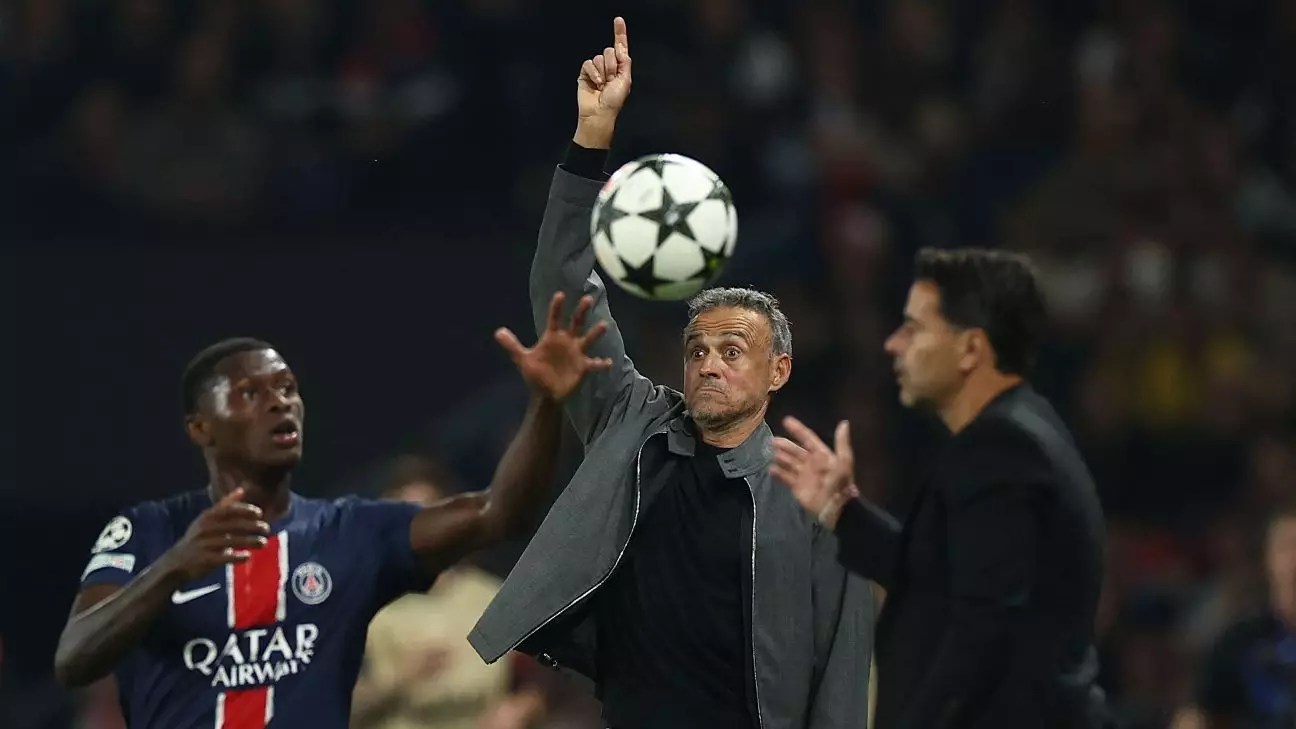The football world is currently abuzz with the changes brought on by the new Champions League format, which has introduced a layer of uncertainty that impacts clubs and coaches alike. Paris Saint-Germain (PSG), under the guidance of manager Luis Enrique, has recently started its campaign with a narrow victory against Girona, yet the implications of that win remain clouded in ambiguity. Enrique’s reflections following the match highlight not just the triumph of the night, but the broader concerns about the unpredictable landscape of the competition.
Despite dominating possession and creating multiple chances, PSG’s win against Girona came only after a late blunder by the Girona goalkeeper, Paulo Gazzaniga. His misstep resulted in a decisive goal that awarded PSG a much-needed 1-0 victory. Luis Enrique acknowledged the intensity of the match, emphasizing that the result doesn’t significantly clarify the standing of PSG within the new league format. “Winning is challenging, but how this competition plays out is still a mystery,” he remarked, underlining the uncertainties of what lies ahead.
The altered structure of the Champions League demands clubs to navigate eight matches against different opponents within a league-like setup, further adding to the strategic complexity of the tournament. Enrique’s cautious optimism serves as a reminder that while securing three points is vital, the future outcomes depend significantly on performances throughout the group phase.
In reflecting on the match itself, Enrique exhibited a deep analysis of the tactical landscape. He noted that Girona’s surprising resilience forced PSG into a reactive style of play, which posed challenges for the French champions. “They spun us around and made us dizzy,” he stated, implying a game plan centered on disruptiveness that forced PSG to relinquish its rhythm. This competitive dynamic prompted Enrique to acknowledge the need for a more aggressive approach to ensure future victories and to avoid struggling against lesser-known teams.
As the competition unfolds, Enrique will have to assess how his squad adapts to different challenges across upcoming fixtures. His considerations of meeting teams with varying levels of preparedness point toward the necessity for strategic flexibility—a trait that can define success in unpredictable scenarios.
The match against Girona also raised concerns surrounding squad depth, particularly with the unfortunate injury to striker Marco Asensio, who exited before halftime. Enrique’s reaction illustrated both the gravity of injuries in professional football and the resilience he believes is present within his team. He stressed the importance of being able to rely on all available players throughout the season. “Marco has been pivotal for us, yet this is a part of professional football,” he surmised, recognizing the challenges of sustaining form amidst the rigors of competition.
Injuries can shape the narratives of seasons, and navigating these trials will test PSG’s roster—hallmarked by talent but often criticized for inconsistency. The manager’s faith in his players foreshadows the need for them to rise to occasions and establish depth as a critical factor in transcending the competition’s uncertainties.
In the broader context of the Champions League, PSG’s victory against Girona, while a positive step, is merely a single chapter in an extensive story. Enrique’s thoughtful analysis has drawn attention to the much larger game at play, where consistency, depth, and strategy will be key determinants of success. Girona’s manager, Michel, also channeled the spirit of optimism despite the loss, encouraging his players to take pride in their performance as they prepare for the challenges that lie ahead.
As the league phase progresses, the implications of each match will grow in significance, transforming otherwise routine games into critical evaluation points. PSG’s upcoming matchup against Reims this weekend, along with Girona’s fixture against Valencia, will serve as litmus tests, not only for individual teams but for the league’s format itself. The reshaped Champions League format is a spectacle that promises excitement, challenges, and the need for adaptation, beckoning players and fans into a new era of thrilling football.


Leave a Reply